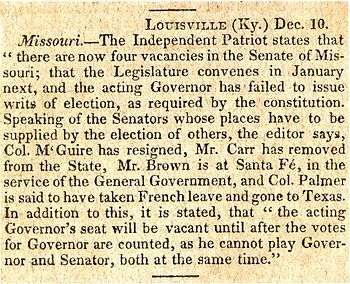Gone to Texas

Gone to Texas (often abbreviated GTT), was a phrase used by Americans emmigrating to Texas in the 1800s[1] often to escape debt[2] incurred during the Panic of 1819. Moving to Texas, which at the time was part of Mexico, was particularly popular among debtors from the South and West.[3]
The phrase was often written on the doors of abandoned houses or posted as a sign on fences.[4]

While speaking in Nacogdoches, Texas in early 1836, shortly before his death at The Alamo, Davy Crockett is famously quoted regarding his last campaign for Congress,[5]
"In my last canvass, I told the people of my district, that, if they saw fit to re-elect me, I would serve them faithfully as I had done; but, if not, they might all go to h---, and I would go to Texas. I was beaten, gentlemen, and here I am."
Recently, the Governor's Office of Economic Development has revived the use of "Gone to Texas" as part of its plan to attract businesses to Texas under its current advertising campaign "Texas. Wide Open For Business".
References
- ↑ National Gazette and Literary Register - December 29, 1825, "Col. Palmer is said to have taken French leave and gone to Texas." from online source, verified 2005-12-30.
- ↑ UTSA ITC Education Scrapbook - Texas the Shape and the Name, The University of Texas at San Antonio, Institute of Texan Cultures. 1996-2001, verified 2005-12-30.
- ↑ Samuel May Williams, Early Texas Entrepreneur, Margaret Swett Henson
- ↑ "G.T.T.", The Handbook of Texas Online. Also see Smith, Sidney (1850). The Settler's New Home : Or, Whether to Go, and Whither?. London: John Kendrick. p. 128. Retrieved 2009-05-27. discouraging emigration by noting that "'Gone to Texas' has become the proverb for a scamp#PPA674,M1 Thirty years' view; or, A history of the working of the American government for thirty years, from 1820 to 1850 (Vol. 1)Benton, Thomas Hart (1854), New York: D. Appleton and Company, p. 674 Missing or empty
|title=(help) Also see South-Western Immigration Company (Austin, Texas) (1881). Texas: Her Resources and Capabilities. New York: E.D. Slater. encouraging immigration and remarking on the "slang use" of the term a "generation ago" to refer to fugitives from justice. - ↑ Niles' Weekly Register - April 9, 1836, "A gentleman from Nacogdoches, in Texas, informs us, that, whilst there, he dined in public with col. Crockett, who had just arrived from Tennessee. The old bear-hunter, on being toasted, made a speech to the Texians, replete with his usual dry humor. He began nearly in this style: "I am told, gentlemen, that, when a stranger, like myself,arrives among you, the first inquiry is -- what brought you here? To satisfy your curiosity at once as to myself, I will tell you all about it. I was, for some years, a member of congress. In my last canvass, I told the people of my district, that, if they saw fit to re-elect me, I would serve them faithfully as I had done; but, if not, they might all go to h---, and I would go to Texas. I was beaten, gentlemen, and here I am." The roar of applaus was like a thunder-burst."
Further reading
- Campbell, Randolph (2003). Gone To Texas - A History of the Lone Star State. Oxford University Press. ISBN 0-19-513843-0.
- Hughes, Thomas (1884). G. T. T. Gone to Texas: Letters from Our Boys. New York: MacMillan. Retrieved 2009-05-23.
0